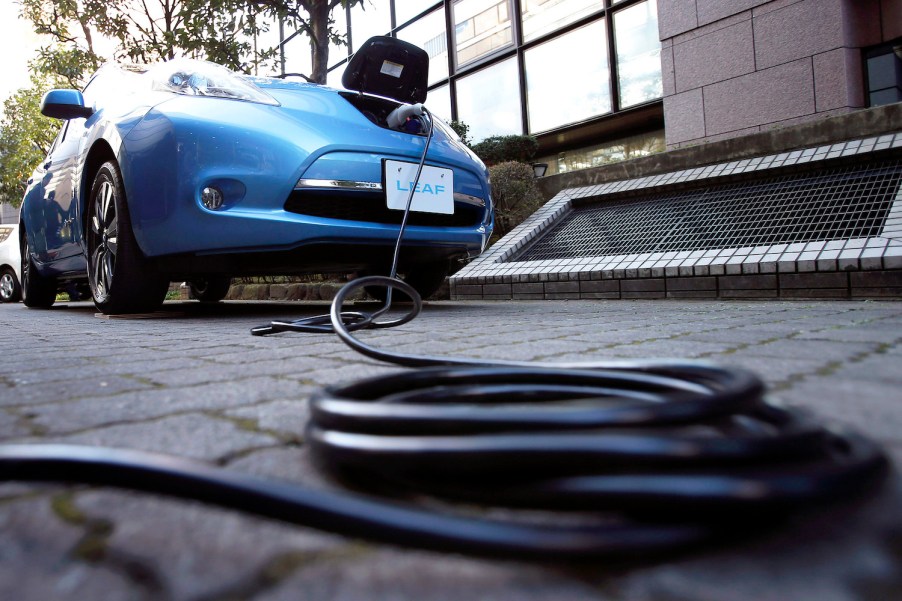
Automakers Need To Take a Leaf Out of Nissan’s Book and Sell Upgraded EV Batteries
Imagine you’ve been driving the same EV for a decade. You love your electric vehicles, and its drivetrain has a million miles of life left, but its battery pack is beginning to wear out. You would probably be happy to buy an upgraded battery pack from the automaker, increasing your EVs range and extending its life by another decade. Yet precious few automakers are planning ahead to sell enhanced replacement batteries. If all automakers did so they would stand to make a lot more money down the road. In addition, they might settle current buyers’ range anxiety and sell a lot more EVs.
Can you upgrade an EV’s battery size?
Theoretically, it should be possible to order an upgraded battery–with an improved range–for most any electric vehicle. In practice, this is only an option for a select few EV models.

Every year, scientists learn to create more “energy-dense” battery packs. This means that they can build higher kWh battery packs with the same footprint as the lower kWh batteries in early EVs. One startup built a 750-mile Tesla battery pack that it could fit into a stock Model S.
In addition, some automakers offer multiple kWh versions of the same EV model. Often, all the versions feature identical battery pack sizes, each with a different number of cells. Low kWh Teslas, for example, are infamous for simply having battery trays with some empty space.
If every automaker manufacturing EVs made certain to keep its battery pack size and shapes as consistent as possible, it would be easier for them to offer upgrade options as technology improves in the future.
Which automakers offer enhanced replacement EV batteries?
At present, few automakers offer upgraded battery packs for their EVs. According to EVsEnhanced.com the only EVS with OEM battery upgrades are Teslas, BMW i3s, and certain Nissan Leafs.

Tesla has prioritized making its battery packs easy to upgrade since it first began selling EVs. When the company first began selling the Model S, it kept entry costs low with a 40 kWh battery pack that topped out at 139 miles of range. Since those days, it has built 60, 70, 75, 85, 90, and even 100 kWh battery packs for the same vehicle. But throughout these improvements, Tesla has maintained the same size battery tray, simply packing in more lithium-ion cells for higher kWh batteries.
Today, Tesla is happy to sell higher kWh battery packs to owners of older vehicles with a shorter range. In fact, the automaker offers over-the-air software updates so Teslas can get the most performance possible out of an upgraded battery pack. Any limitations the company imposes are purely logistical: The 100 kWh battery packs, for example, are too heavy for the suspension in the early 40 kWh Model S cars. And the automaker built upgraded battery packs for its Roadster for a time, but then ceased production of the original Roadster and doesn’t offer special-ordered battery packs.
Nissan originally stated that it would be impossible to upgrade the batteries in its Leaf EVs. But in 2019, Nissan began to offer special 40 kWh battery packs already pre-programmed to function in 2016-17 Leafs which originally shipped with 30 kWh batteries. Aftermarket companies have found ways to upgrade older Leafs with a wider array of Nissan-built batteries.
Electrification will transform the lifespan of the average car

Most electric vehicle motors will likely last hundreds of thousands of miles longer than internal combustion engines. Electrification could completely transform how long the average vehicle is on the road.
Tesla seems aware of this, having released one style of each model and limiting visual refreshes: a first-generation Model S with an upgraded battery still looks at home on today’s roads. But more traditional automakers may be less nimble in the evolving market. An upgraded battery pack–costing thousands of dollars–would be a great way to continue making money on long-life vehicles.
For aftermarket companies to offer upgraded battery packs for most EVs, they will need some manufacturer support–often in the form of software patches enabling higher kWh batteries. We’ll have to wait and see which automakers will offer such support.
If automakers pledged to support aftermarket battery pack manufacturers–or to someday offer their own upgraded battery packs–it would go along way towards helping modern buyers embrace EVs. Such a promise could address both the high cost of EVs and range anxiety. While such a promise might seem bad for business, to traditional automakers, it could actually help them sell more EVs.
Next, find out how much it will cost to replace a battery pack.



